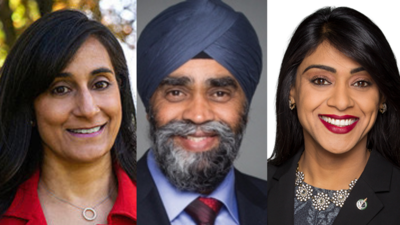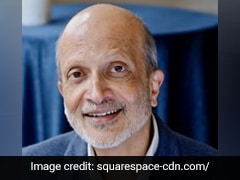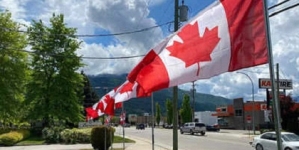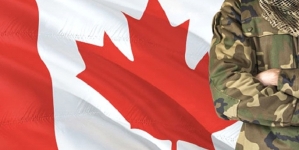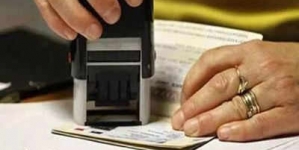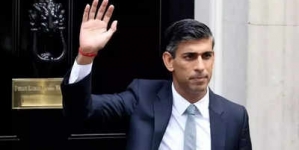-
LONDON: Indian-Origin Teen In UK Gets “Life-Changing” Cancer Treatment - 9 hours ago
-
SILICON VALLEY: All About Pavan Davuluri, New Head Of Microsoft Windows - 9 hours ago
-
LONDON: UK’s India Gate To Commemorate Role Of Indian Soldiers From World Wars - 1 day ago
-
HARARE: Shri Bramha Kumar appointed as the next Ambassador of India to the Republic of Zimbabwe - 2 days ago
-
LONDON: Indian-Origin Principal Wins UK Legal Challenge Over School Prayer Ban - 2 days ago
-
TORONTO: Indian-Origin Doctor Needs ₹ 2 Crore For Legal Fees. Elon Musk Responds - April 22, 2024
-
KINSHASA: India-Democratic Republic of Congo Foreign Office Consultations - April 21, 2024
-
LONDON: UK Court Allows Sale Of Nirav Modi’s Luxury London Apartment - April 21, 2024
-
TEHRAN: Travel advisory for Iran and Israel - April 20, 2024
-
LUXEMBOURG: Shri Saurabh Kumar concurrently accredited as the next Ambassador of India to the Grand Duchy of Luxembourg - April 20, 2024
TORONTO: Several Indian-Canadians in the fray for Canada elections on September 20
TORONTO: When Canada votes on September
20 to elect a new federal government, there will be many Punjabi and Sikh
candidates whose fate will be decided. According to the Indian High Commission
in Ottawa, the Canadian House of Commons (total strength 338) currently has 22
Members of Parliament of Indian-origin.
This includes three ministers in
the Cabinet, including defence minister Harjit S. Sajjan; minister of
diversity, inclusion and youth Bardish Chagger; and minister of public services
and procurement Anita Anand. Jagmeet Singh, leader of New Democratic Party, the
party that provides support in parliament to the minority Liberal government of
Justin Trudeau, is also an MP.
During his recent campaigning in New Brunswick province last weekend, Canada
Prime Minister Justin Trudeau, who heads a Liberal Party minority government,
had procurement minister Anita Anand, whom he called his minister of vaccines,
by his side.
Anand has relaunched her own
campaign for re-election from Oakville, Ontario. Minister Bardish Chagger, MP
since 2015 from the riding of Waterloo, Ontario, is also contesting again.
Defence minister in the Trudeau
Cabinet, Harjit Sajjan, who was first elected MP in 2015, is also seeking
re-election from Vancouver South. Indians form a large part of the population
of this district and Conservative candidate Sukhbir Singh Gill is also of
Indian origin.
Jagmeet Singh, MP from Burnaby
South, British Columbia since 2019, and leader of the New Democratic Party
since 2017, is likely to play an important role in the election. In the 2019
federal election, the New Democrats under Singh won 24 seats. Liberals led by
Trudeau were re-elected but reduced to a minority government, with the support
of NDP. Hence as its leader, Jagmeet Singh could again emerge kingmaker after
the election results are declared.
Ujjal Dosanjh, who has served as premier of the state of British Columbia;
Liberal Party MP and minister of health feels that regardless of which party or
political dispensation forms the government in Canada, there will be a sizeable
number of Indian Canadians elected, especially in districts such as Surrey, in
the province of British Columbia, which have large a Punjabi population.
“Though there have been references to the
farmers protests in India and support expressed over the last few months by the
political parties in Canada, since many Indian Canadians have their roots in
Punjab, I don’t think any specific issues of the Indian community are being
raised during the election campaign,” Dosanjh told timesofindia.com from
Vancouver.
While Randeep S. Sarai, the MP representing the electoral district of Surrey
Centre is seeking re-election in the Greater Toronto Metropolitan Area, which
is also home to a large Indian Canadian population, Liberal members of
parliament Maninder Sidhu (Brampton East), Ruby Sahota (Brampton North), Kamal
Khera (Brampton West) and Sonia Sidhu (Brampton South) are in the fray again.
Navdeep Bains (Mississauga-Malton), who was earlier a minister in the Trudeau
Cabinet, has, however, announced that he is stepping away from politics and is
not in the race.
Liberal MP Gagan Sikand
(Mississauga-Streetsville) and Independent Ramesh Sangha (Brampton Centre) are
also not seeking re-election. Sangha was removed from the Liberal caucus this
January because he had spoken out against the government.
Indian American Conservative party candidates
Jasveen Rattan, Jagdeep Singh, Naval Bajaj, Medha Joshi and Ramandeep Singh
Brar are contesting from the ridings of Mississauga-Streetsville, Brampton
Centre, Brampton East, Brampton North and Brampton South. Anju Dhillon, Liberal
MP from Dorval—Lachine—LaSalle, who is the first South Asian to be elected from
the province of Quebec, is also campaigning for re-election.
In Alberta, Conservative
candidate Tim S Uppal (Edmonton Mills Wood), who had defeated former Liberal
Cabinet minister, Amarjeet Sohi, is also contesting again.
The most important issues that
are likely to become deciding factors in Canada’s upcoming elections include
management of the Covid-19 pandemic and the economy. However, with Indian
Canadian candidates representing all the big parties and playing an important
role in politics, issues which are specifically of concern to the Indian
community could also play an important role in deciding winners, feel some
political analysts.
“The ongoing travel ban on
flights from India, which has been extended to September 21, is hurting members
of the community hard. Indian students, who bring in valuable foreign exchange
for universities as well as the Canadian economy, are facing great hardships in
reaching their institutions to attend in person classes.
Besides, the ban is also hurting
small businesses in Canada, many of which are run by people of Indian origin,
and Canada-India trade,” says Hemant M Shah, trade director, Overseas Friends
of India Canada, an Ottawa based organisation.
Dr Shivendra Dwivedi, a doctor in
Montreal and national president of Canada-India Global Forum, an organisation
that helps build international business networks, also agrees that the travel
ban on Indians by the Canadian government with no relaxation even for
vaccinated passengers will have an impact on who Indian-Canadians will vote
for. “The ban has been extended till after election day and is causing a lot of
hardships for members of the community. It is very unfair since no other
country faces a similar ban. We have communicated this to the Canadian Prime
Minister’s office,” Dr Dwivedi said. Considering that the Indian community has
high visibility across the political spectrum as well as in business, academics
and other walks of life in Canada; Dr Dwivedi feels that issues such as a long
delay in signing of the India-Canada free trade agreement and the Canadian
government supporting the farmers protest in Punjab could also have an impact
on the election.
National Alliance of Indo-Canadians is, in fact, reaching out of
candidates from the community to sign a pledge for the federal elections to
reject vote-based, divisive politics, based on ethnicity, religion, race,
gender etc.
The pledge also raises the issue of immediate resumption of direct
flights between Canada and India, as this prohibition has caused great distress
to Indo-Canadians, separated families and severely damaged the prospects of
students from India wishing to pursue higher studies in Canada. “It is
important for the community to fight divisive politics and also to call out
extremist elements that support the Khalistan movement and violence.
Another concern is the fact that many Indian Canadians who are stranded in
India because of the ban on direct flights will not be able to cast their vote
and are being deprived of their rights,” Dr Azad Kaushik, president of the
alliance said.


















